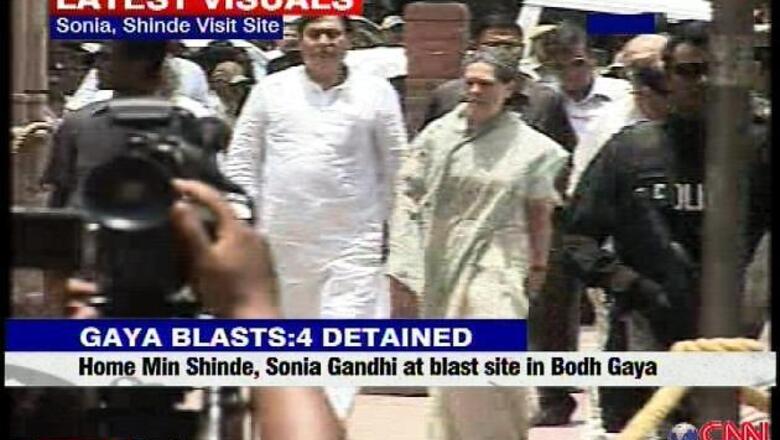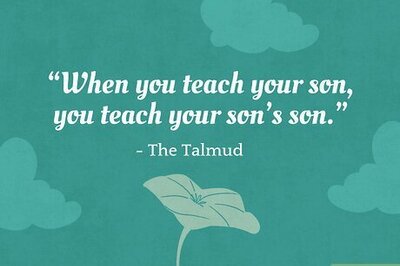
views
Since places for worship in India usually attract an unusually high number of devotees, is maintaining security a more difficult task there? Since targeting of religious places can lead to ready communal conflagration, what should the government do to ensure security in such places? Senior Journalist Praveen Swami joined IBNLive readers for an interaction on the issue.
Q. Why are we not able to crack any cases of blast properly? There seems to be no clarity on who has carried out various attacks. Do you think there is no proper coordination between intelligent agencies and there are no trails left after any blast because of the crowd? Asked by: sree
A. I think there's a deeper problem than coordination, Sree: it's the lack of capacity. Our intelligence services are, by the government's own admission, a third under strength; the less said about the police, the better. Training procedures and capacity have barely grown in decades, and forensic science infrastructure is really anemic. The problem is there is too little intelligence and criminal investigation capacity. This is going to take money, time and vision to fix-and these are rare commodities in our country. Let's not get carried away, though: there are cases which have got solved; prosecutions are underway; and in some cases have been successful.
Q. There was overwhelming evidence to prove that Israt Jahan had links with terrorists. Whether her encounter was a fake one or genuine is a different story. But when police officers who take action based on intelligence reports are persecuted for political reasons and are caught between the ruling and the opposition party, don't you think that expecting the same police to act on intelligence reports in this case is a bit of a cruel irony. Asked by: Deepak
A. "Overwhelming evidence" is a strong term-and I do not agree it exists on Ishrat Jehan. There is no real legally robust evidence, because the case was never properly investigated. In this case, the CBI says police and intelligence officers both conspired to kill Ishrat Jehan and the three men with her. They have not given a reason, at least as yet. In my view-which is different from evidence-it is indeed disingenuous to blame it all on relatively junior police officials. In my view, there should also be a nuanced and serious debate on why encounters happened, and why they happened.
Q. In most countries if you are wrongly harassed, arrested by police, they can sue the government agencies and claim damages. While in India, the police has still not apologised for cases such as malegaon and samjhauta. Shouldn't the police be accountable for its actions? Why isn't the media highlighting this? Asked by: MI Siddiqui
A. I'm not sure why you think the police or anyone else-other than the perpetrators, possibly-should apologise for the Samjhauta case. There were no wrongful arrests. I'm not sure which of the two Malegaon cases you are referring to, but there is strong reason to believe there may have been wrongful arrests in one. The victims have the right, in India as elsewhere, to seek redress through the legal system.
Q. Praveen, as citizens what should be our role in trying and stopping this? Most of us hope and think that temples are sacred places and tend to believe that how can anyone die at god's doorstep. I think we need to gradually come out of this belief and be a bit more alert to our surroundings and possible dangers and contribute towards security rather than hoping for the government to solve all issues. We need to contribute our bit as well. Asked by: JK
A. JK, I think the biggest service we as citizens can do is to push our politicians to give us a genuine template for professionalising and modernising the intelligence and police services. You can't have a police force that useless at everything, but brilliant at protecting temples. Either you build comprehensive capacities, or you suffer the consequences. A nineteenth-century police force can't fight twenty-first century terrorism. Sadly, the debate always degenerates into political point-scoring and abuse.
Q. Do you think Islamic terror will exist as long as the conflict in west Asia between Israel and Palestine exists? But just want to know from you, have the Islamic countries done anything concrete for the Palestinians. I read that they don't even offer citizenship for the Palestinians. Then where is their sincerity. Asked by: sandeep
A. I don't think there is any such thing as "Islamic terrorism". There is a thing called "Islamist terrorism", which seeks to further a political ideology drawing inspiration from certain (contested) interpretations of Islam. This is an important discussion. Re. the Israel-Palestine debate, please write in to IBN Live's administrators and ask them to host a middle-east discussion with my excellent colleague, Suhasini Haider. There are lots of fascinating things there, but that's not my area of expertise and so I hesitate to comment.
Q. Don't you think India has matured enough to not indulge in riots just because a religious center is attacked? Why should India be targeted because of some incidents in Myanmar? Asked by: sree
A. I certainly think India has matured--but not matured enough for us to be calm about an act of religious provocation. I look around at the abuse and paranoia which (thankfully a minority) of Hindus and Muslims are hurling at each other these days, and feel deeply sad. Re. Myanmar, you're right-but you should find the Lashkar-e-Taiba on Twitter and ask them why they're targeting India because of Myanmar--I can't see any logic to their calls!
Q. What do the bombers in India want? What are their specific demands? They just keep bombing crowded places at random. Asked by: ajay
A. Well, there are lots of bombers, of different belief systems and values: there are ethnic and religious terrorists in the North-East, jihadists in Kashmir, Khalistanis in Punjab, Hindutva terrorists in several states. So there is no one-size-fits-all answer. All of them, though, claim to be acting to avenge wrong doing (for example, some Islamists say they are avenging the 2002 violence in Gujarat).
Q. If police arrests a suspect and claims him to be a terrorist (which they are not -Liaqat, Malegaon, samjahuta etc ) doesn't media has a responsibility to verify this or should it just report it as a fact as it is coming from police? Asked by: MI Siddiqui
A. I frankly don't understand your question. The reason you know about the the criticism of Delhi Police handling of the Liaqat Shah case, or about the role of Hindutva groups in Malegaon and Samjhauta, is because of the same media and police you criticise (unless you say you personally investigated these matters and discovered the truth by yourself, which I assume you're not saying). If you're asking me if the media should strive to tell all sides of the story, I agree. I think it mostly does-in every case, you'll find some articles on what the police is saying, others on what the alleged terrorists' families are saying, etc. We're also usually careful to use terms like "alleged", and to source the information to who is saying it--e.g., "police allege--so that you can make up your own mind about whether to believe the information or not.
Q. In the Bodh Gaya blast incident, intelligence inputs were available months in advance and State government was alerted. When intelligence inputs were available don't you think that the agencies should have been able to pinpoint the source of the conspiracy and zero in on their location and identity? And nab them. Is it sufficient just to say that the State government was warned though of course they are also guilty on not taking adequate measures to strengthen the security of the temple complex? Asked by: Dilip
A. You're right, Dilip, but the problem is much deeper. Let me try and answer this question, Dilip, with an analogy. Before 26/11, the Mumbai Police had multiple warnings, from the CIA and RAW, on a pending attack. They actually posted guards outside the Taj for a while, in September. Yet, the information wasn't specific--and when it didn't happen in a few weeks, the police were deployed elsewhere. Now, the things is, there just aren't enough police to be posted everywhere all the time--and even if they were, their training isn't adequate for the job. Bihar is one of the shortest staffed police forces in the country. So everyone's guilty--but assigning blame doesn't fix things. Fixing things needs a blueprint for police reform.
Q. Why is it that governments , both state and center identify sanctimonious places of worship and ensure adequate security measure are in place? Not just at the time of festivals, but also during off periods, the police and other agencies should review and enhance security? With technological advancements made in various fields, why don't we use them, other than just involving security personnel alone? Asked by: EM
A. Simple answer, EM: as I just mentioned to Dilip, we have huge infrastructure shortages, and fixing them takes vision and money. Look at this from the point of view of a policy-maker, though: if I have Rs.100, do I spend it on more roads, more hospitals, more schools or more policing technology? So, given that I have finite resources, I make trade-offs and compromises. Now, people like me argue that security is important, because without it our society becomes vulnerable to all kind of stresses-so instead of Rs. 2 from this basket, maybe we should spend Rs. 5. Not everyone agrees, though.
Q. As a diverse country, which has promoted harmony between different cultures and religion, why is it that we succumb to the wiles of the politicians, who promote division amongst the people? We should abhor all forms of violence, whoever promotes it, irrespective of religion of caste. But today, people talk only about caste and religion. No one seems to be concerned about the overall health and wealth of the nation. Your thoughts. Asked by: EM
A. That's a great question. I wish I had an answer. I know this, though: unless we start thinking of ourselves as citizens, not as members of a particular religious group, caste or whatever, our future as a nation isn't bright.
Q. Don't you think any government in India does not want to solve the terror problem, as it helps them to politicize the issue, make media headlines and innocent people keep on dying? Asked by: Jayesh
A. I certainly think its true governments have exploited religious and caste tensions, not just on terrorism but riots and a variety of political issues.
Q. The 'protector' needs protection? Destroying the place of worship when the Government is not able to prevent it is an act of communal nature. The secular Government tries to keep a cloak of secrecy on the investigation to prevent communal flare ups. Is this ok? Asked by: sundar1950in
A. As an atheist, I'll ask why god needs protection at all. Leave that aside, though: why should temples or mosques or churches which receive huge revenues from pious visitors be protected by the government? Why should my taxes pay for you or someone else's private religious beliefs? In my view, particularly when we're short of police for protecting our streets and public places, its high time religious institutions paid for private security.
Q. In Somnath which a visited, they did not allow an unbroken coconut inside for offering to deity. Security to the possible level was observed. In spite of such check a breach can happen anywhere when the criminals do a recon and plan accordingly. What is the level of public alertness on this? Asked by: sundar1950in
A. I think the cooperation of people is essential to fighting terrorism-useful leads have often come from the community. Many of us though-with good reason-hesitate to get involved in police matters.
Q. Crowded places like cinema hall, a mall, railway station or a bus stand would be a more soft target where the criminal can merge with the heterogeneous group in such places. Earlier acts also point out that such places have had more victims and more of peace disturbed. Why did media target places of worship to report it as a soft target or Sitting Duck and say "waiting to happen"? Asked by: sundar1950in
A. Everywhere can't be protected all the time. Yet, I think a lot more can be done. It's not just a question of putting guards in place, but people cooperating with them. We Indians are notoriously arrogant on these things-we always argue with guards at airports and public buildings, refusing to cooperate with the necessary drills.
Q. The majority of the people visiting places of worship does not stay for long and can be distinguished from a person entering with intention to shatter peace. A little bit of a alert security is sufficient to minimise any major disaster. Your take on this? Asked by: sundar1950in
A. Sundar, you must have a magic eye if you can distinguish an ordinary visitor to a place of worship from a terrorist! You should offer it to our police forces-they'd be thrilled :)
Q. Don't you think that places of worship are targets due to the possible large scale damages and communal tensions rather than they being a soft target? Asked by: sundar1950in
A. Yes, I totally agree-the idea is to create disruption, and to deepen the fault-lines in our society. The question before us as Indians is: what are we doing, in our lives, to heal those fault lines so that terrorists won't exploit them? What are we doing to eradicate bias and hatred from our own behavior and community? I think every society benefits from taking a hard look in the mirror once in a while-and perhaps this is a good time for all of us to do so.
Q. Is the NCTC a step in the right direction? or Is it just a proposal on paper without actually strengthening what is really required on the ground i.e. comprehensive capabilities. Asked by: JK
A. JK, I don't have a problem with the NCTC concept per se except I think it's an evasion of the real issue. A mechanism to better coordinate information flows will only work when there's information there in the first place. Sadly, in India, the problem is there's too little information. What's the point of having another new bureaucracy to administer it?




















Comments
0 comment